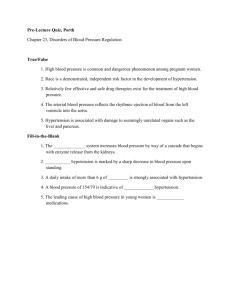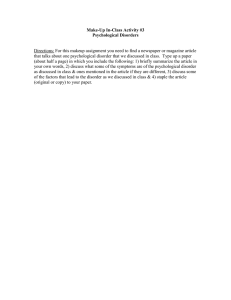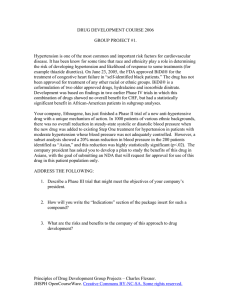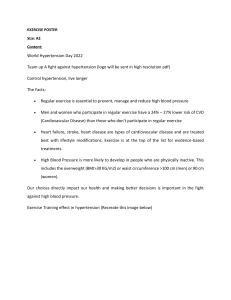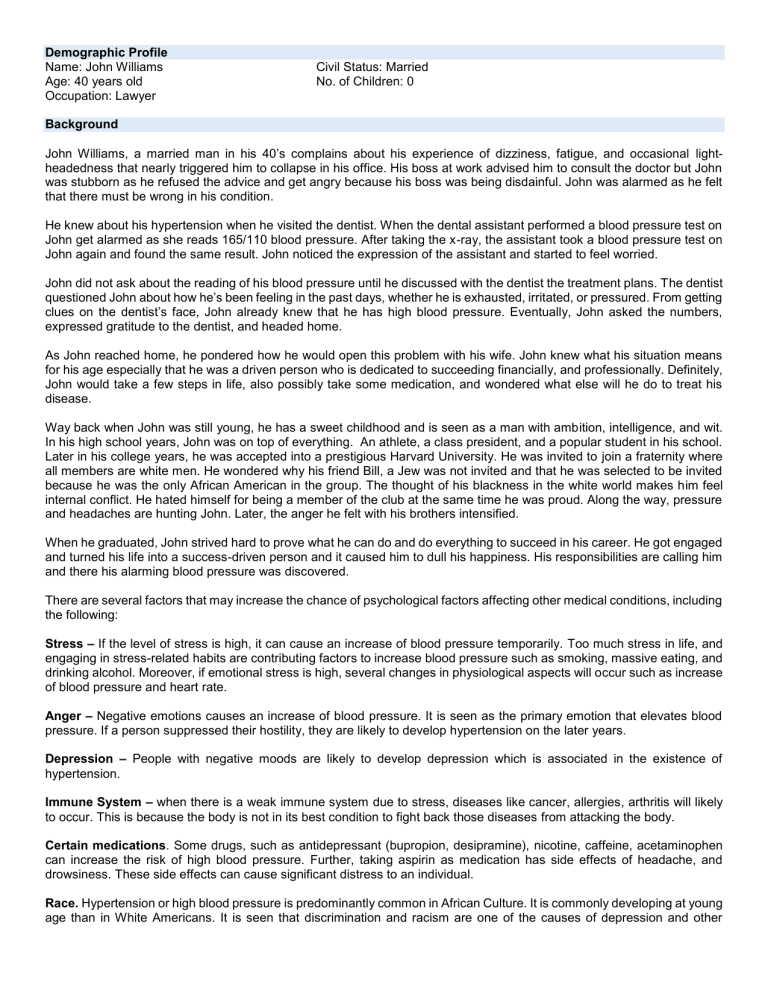
Demographic Profile Name: John Williams Age: 40 years old Occupation: Lawyer Civil Status: Married No. of Children: 0 Background John Williams, a married man in his 40’s complains about his experience of dizziness, fatigue, and occasional lightheadedness that nearly triggered him to collapse in his office. His boss at work advised him to consult the doctor but John was stubborn as he refused the advice and get angry because his boss was being disdainful. John was alarmed as he felt that there must be wrong in his condition. He knew about his hypertension when he visited the dentist. When the dental assistant performed a blood pressure test on John get alarmed as she reads 165/110 blood pressure. After taking the x-ray, the assistant took a blood pressure test on John again and found the same result. John noticed the expression of the assistant and started to feel worried. John did not ask about the reading of his blood pressure until he discussed with the dentist the treatment plans. The dentist questioned John about how he’s been feeling in the past days, whether he is exhausted, irritated, or pressured. From getting clues on the dentist’s face, John already knew that he has high blood pressure. Eventually, John asked the numbers, expressed gratitude to the dentist, and headed home. As John reached home, he pondered how he would open this problem with his wife. John knew what his situation means for his age especially that he was a driven person who is dedicated to succeeding financially, and professionally. Definitely, John would take a few steps in life, also possibly take some medication, and wondered what else will he do to treat his disease. Way back when John was still young, he has a sweet childhood and is seen as a man with ambition, intelligence, and wit. In his high school years, John was on top of everything. An athlete, a class president, and a popular student in his school. Later in his college years, he was accepted into a prestigious Harvard University. He was invited to join a fraternity where all members are white men. He wondered why his friend Bill, a Jew was not invited and that he was selected to be invited because he was the only African American in the group. The thought of his blackness in the white world makes him feel internal conflict. He hated himself for being a member of the club at the same time he was proud. Along the way, pressure and headaches are hunting John. Later, the anger he felt with his brothers intensified. When he graduated, John strived hard to prove what he can do and do everything to succeed in his career. He got engaged and turned his life into a success-driven person and it caused him to dull his happiness. His responsibilities are calling him and there his alarming blood pressure was discovered. There are several factors that may increase the chance of psychological factors affecting other medical conditions, including the following: Stress – If the level of stress is high, it can cause an increase of blood pressure temporarily. Too much stress in life, and engaging in stress-related habits are contributing factors to increase blood pressure such as smoking, massive eating, and drinking alcohol. Moreover, if emotional stress is high, several changes in physiological aspects will occur such as increase of blood pressure and heart rate. Anger – Negative emotions causes an increase of blood pressure. It is seen as the primary emotion that elevates blood pressure. If a person suppressed their hostility, they are likely to develop hypertension on the later years. Depression – People with negative moods are likely to develop depression which is associated in the existence of hypertension. Immune System – when there is a weak immune system due to stress, diseases like cancer, allergies, arthritis will likely to occur. This is because the body is not in its best condition to fight back those diseases from attacking the body. Certain medications. Some drugs, such as antidepressant (bupropion, desipramine), nicotine, caffeine, acetaminophen can increase the risk of high blood pressure. Further, taking aspirin as medication has side effects of headache, and drowsiness. These side effects can cause significant distress to an individual. Race. Hypertension or high blood pressure is predominantly common in African Culture. It is commonly developing at young age than in White Americans. It is seen that discrimination and racism are one of the causes of depression and other negative emotions. Moreover, other serious illnesses often occur in their culture such as heart attack, kidney failure and stroke. Coping styles: Sometimes when a person was being discriminated, they cope with this by driving their selves towards success. They will be hard-working and determined enough to achieved greater success which will lead them to higher risk of hypertension. Conflict. When a person is experiencing an internal conflict, that gives her/him a high level of stress, anxiety, and worries. These factors might contribute to worsening of a medical condition, Genetics. A family history of hypertension may increase the risk. It is said that hypertension runs in the blood and in family. If the parents have hypertension, there is a huge tendency that the offspring will develop and inherent this condition. Further, if psychological stress is dominant in the family, it can affect its members. Other personal problems. Problems such as social pressure, occupational stress can contribute to the risk of developing stressful psychological situation that can affect other mental condition. Further, emotional distress caused by worrying about the past and the future is considered as a contributing psychological factor. In John’s case, having a hypertension bothered him. As he did not know how to open this problem to his wife and tries not to confront this disease. He wondered what else he will do not show it but it he failed. He was worried about his medical condition and think of what are the things that led him to hypertension. Therefore, this led to psychological factor affecting other medical condition. Reasons for referral Initially, John is complaining to his wife about his fatigue, dizziness, and occasional light-headedness that nearly caused him to collapse in his office. He had known about his blood pressure condition when he visited his dentist for a check-up. At first, he hesitated to know the blood pressure reading but as he talked to the doctor, he slowly recognized and accept his current medical condition. John thinks about how he ends up with this condition and he doesn’t know how to addressed this problem to his wife and wondered what else will he do to his hypertension. Diagnosis and Justification After a thorough analysis of the data presented, the client was able to meet criteria A-C where criteria A-C represents a psychological factor affecting other medical conditions. This abnormal psychology student came up with the diagnosis of Psychological Factors Affecting Other Medical Condition 316 (F54), a mild one, as supplied by the evidence on the table found below. Criteria A. A medical symptom or condition (other than a mental disorder) is present Factors Given John was able to meet criterion A as he has seen with a medical condition of hypertension or high blood pressure. This is evident as he had a visit with his dentist. B. Psychological or behavioral factors adversely affect the medical condition in one of the following ways: 1. The factors have influenced the course of the medical condition as shown by a close temporal association between the psychological factors and the development or exacerbation of, or delayed recovery from, the medical condition The psychological or behavioral factors the present in John is stress, negative emotion such as worry, guilt, and also his job control that affects his physical health. It can be seen in the social history of John that even though he is successful in life, his thirst for success and perfection dulled his happiness and relationship in life. Thus, it stresses him. The internal conflict that he experienced during college and his law school, the suppressed hostility are also considered psychological factors that contribute to his medical condition. 2. The factors interfere with the treatment of the medical condition (e.g., poor adherence) John is an African-American man and it is stated that most African residents have poor adherence to their medication and sometimes, cannot trust their physician. 3. The factors constitute additional wellestablished health risks for the individual. Occupational stress, worries in the past and about the future makes John vulnerable to hypertension. His consistent motivation to achieve success aggravates his level of stress, the pressure in his job, and also the prejudice he encountered established John’s health risk. 4. The factors influence the underlying pathophysiology, precipitating or exacerbating symptoms or necessitating medical attention. John’s experience of tremendous conflict, inhibited angriness, excessive worrying about racism, and resentment in discrimination influence and exacerbate his medical symptoms. C. The psychological and behavioral factors in Criterion B are not better explained by another mental disorder (e.g., panic disorder, major depressive disorder, posttraumatic stress disorder). The psychological and behavioral factors in Criterion B were not explained by another mental disorder as John is not seen to have disorders related in mental condition. Specify current severity: Mild: Increases medical risk (e.g., inconsistent adherence with antihypertension treatment). Moderate: Aggravates underlying medical condition (e.g., anxiety aggravating asthma). Severe: Results in medical hospitalization or emergency room visit. Extreme: Results in severe, life-threatening risk (e.g., ignoring heart attack symptoms) John’s current severity condition is mild because the symptoms he showed (high stress level, guilt, worries) increases his medical condition which is the hypertension. Treatment BEHAVIORAL DEFINITIONS 1. High level of stress. 2. Excessive worry and guilt. 3. Suppressed emotions. 4. Inhibited angriness. 5. Fear of losing anger control. 6. Lack of a healthy lifestyle. 7. Unresolved past issues. LONG-TERM GOALS 1. Alleviate existing psychological factors that affect the medical condition such as stress, and negative emotions. 2. Acknowledge the medical condition, accept it and cope with it through changing into positive perspectives and emotions. 3. Control the intake of medications that lowers blood pressure. 4. Develop a healthy lifestyle that would lead to a healthy and active body. 5. Develop healthy and positive thinking in life. 6. Develop an effective relaxation and meditation techniques to enable the patient to have control in relaxing their selves amidst unpleasant situations. 7. Develop effective coping strategy in handling stressful life situations. 8. Provide information that will educate the patient on the effects of psychological factors in a medical condition. 9. Perform psychotherapy to let the client overcome his behaviors, thoughts, and feelings that caused him significant distress. SHORT-TERM OBJECTIVES THERAPEUTIC INTERVENTIONS 1. Verbalize any history of past and present thoughts that bothered the client. 1.Encourage the client to share his/her thoughts and feelings about the past that gives him a high level of stress and worry. Show understanding and empathy to build rapport while identifying factors that contribute to his medical condition. 2. Complete a mental status examination to assess the patient’s current mental state and also a physical examination to assess the current physical state and to know what is coherent treatment the patient needs. 2. Arrange and administer mental status and physical examination (blood pressure test, blood test, etc.,) to the patient. Evaluate the results and tell feedback to the client so that they are aware of their current mental and physical status and allowing them to decide if they are willing to undergo treatment. 3. Disclose any information that contributes to the existence of his medical condition. 3. Assess the client’s history of activities that will give further information of why his medical condition arise. To further understand his condition and to recommend the appropriate treatment plan. 4. Cooperate with the medical evaluation conducted by the physician. 4. Continuously assess and monitor the client’s medical condition. Constant assessment will help the client to be aware of his condition from time to time and cooperation between the therapist and the client increases the chances of a successful treatment. 5. Provide information relevant to maintaining a healthy lifestyle to develop the physical and mental well-being of the client. (5,6) 5. Assess the client’s level of knowledge about the importance of having a healthy lifestyle. After examining, provide helpful information and health tips that will help the client improve their current physical state. Teach the client the recommended exercise to lower blood pressure and the healthy diet for people with this condition. 6. Assess for any issues of culture, age, or gender that could help elucidate and better understand the client’s current behavior. 6. Inform the client of the importance of relaxation and meditation in improving health conditions. 7. Educate the client on how important relaxation and meditation especially when dealing with stressful life situations. Provide health tips that would encourage the client to perform meditation to control their hypertension. 7. Provide information about the bad effects of stress on health, offer and implement coping mechanisms in stressful life situations. 8. Talk to the client about how stress can affect the health of an individual and how it increases the risk of fatal diseases. Then, assist the client in creating and developing coping strategies that will help him especially when facing stressful situations. 8. Educate the client that their thoughts can affect their medical condition and propose helpful ways in diverting their thoughts into a positive one. 9. Encourage the client to develop positive thinking behavior and practice it consistently. This will help him to divert his thoughts into a better perspective in life. 9. Follow the treatment recommendations of the physician to treat the existing medical condition. 10. Encourage the patient to be cooperative and consistent during treatment sessions. 10. Introduce and perform psychotherapy in the client. 11. Perform psychotherapy on the client and let him be aware of his current mood, behavior, and situation. This is a huge help to strengthen the mind of the client and brought inner happiness and contentment that is good for his emotions. Insight “Life is too short to be worry.” A simple quote that reminds me that life is meant to enjoyed and cherished with the people that makes you happy. Whenever we feel stress about life, we must find ways to let it out because it’s better than suppressing it. Keeping negative emotions is not good so we must avoid it if we love to live longer. Our health is one of the most important things we must consider in order to live the life that we wanted. If we let negative energy like stress affect our lives, we will be able to lose the chance to be happy, and cherish every day as if it is the last day. Hypertension is known as a “silent killer” disease. We are aware that if we are not cautious of the activities that would affect our medical condition, it can put us at risk. Psychological factors such as stress, anxiety, and worries can greatly affect the medical condition we have. Then, I realized that we must value our health. We must be mindful enough in considering what to eat, we must consider exercise to be physically fit and away from the diseases, we must let positivity rule our life because as what they’ve said, positive life, is a healthy life. Positive things will lessen the development of unwanted diseases. Moreover, we must refrain from letting our negative emotions eat us because this is not good for our health. Remember that life is worth living if and only if we are healthy inside out. Prepared by: LOU ARRABELLE B. RAGO (PSY 222, 9036) References: American Psychiatric Association. 2013. Diagnostic and Statistical Manual of Mental Health Disorders (5th Edition). Washington, D.C. First, M. (2020) Treatment of Mental Illness Retrieved from https://www.msdmanuals.com/home/mental-healthdisorders/overview-of-mental-health-care/treatment-of-mental-illness#v746724 Oltmanns, T., Martin, M., Neale, J., Davison, G., (2012). Case Studies in Abnormal Psychology 9 th Edition.


